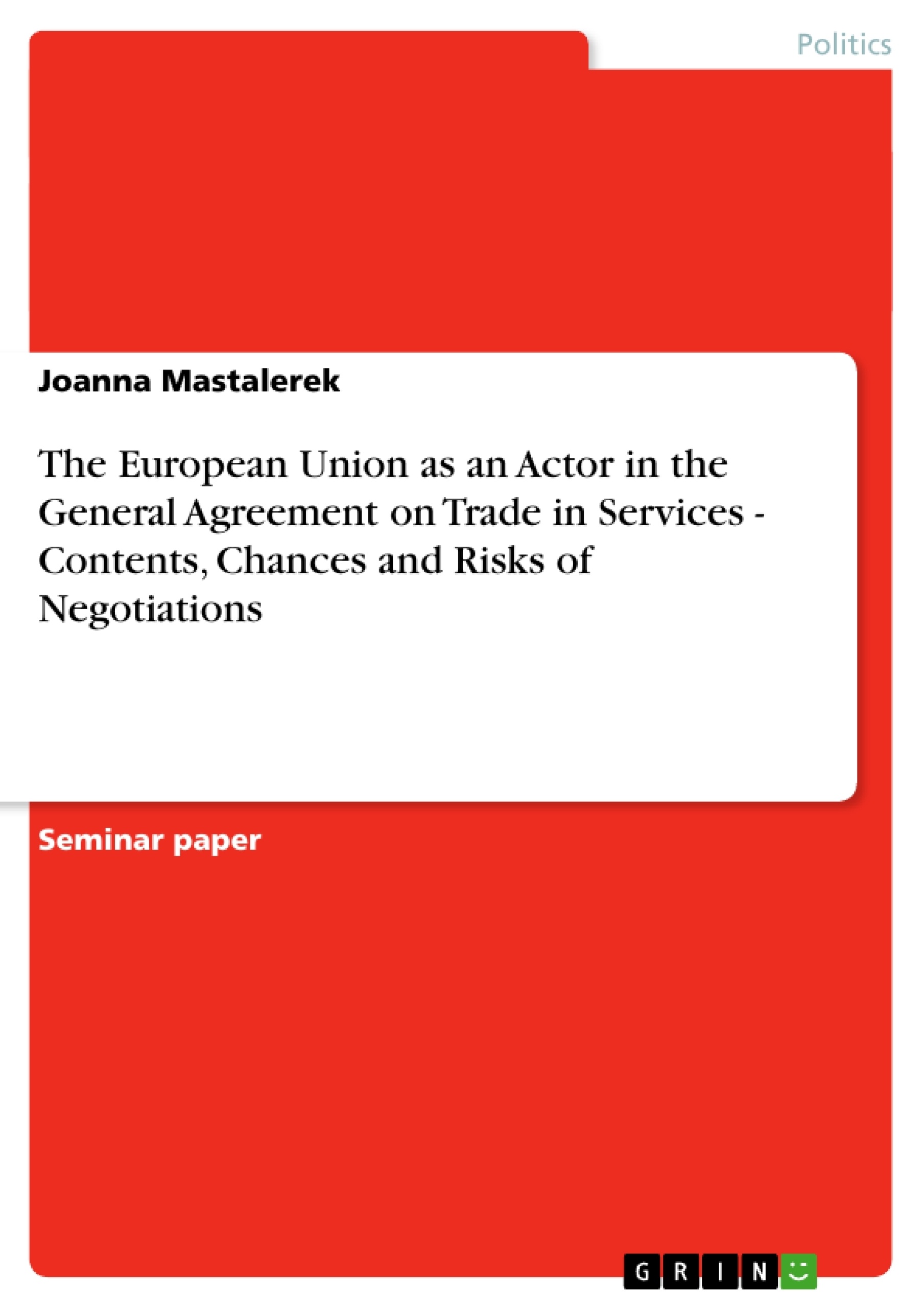In 1994, the majority of countries which founded the WTO in 1995, concluded a first general agreement on the liberalization of services (GATS). Within the framework of the General Agreement on Trade in Services (GATS) liberalization in international trade of services is supposed to be negotiated progressively 1 . Among 12 service subsectors, education is explicitly featured in GATS. However, before the inclusion of education in the Service Round negotiations as part of the Doha Round in the year 2000, educational services did not draw much attention. One reason being the strong underestimation of their market shares.
The EU, as one of the Contracting Parties of the GATS, has already agreed at the Uruguay Round in 1994, to guarantee free access and non-discrimination for foreign competitors in almost the entire education sector, that consists of primary, secondary, tertiary education as well as adult education. Until 2005 the ongoing Doha Round scheduled further liberalization of educational services and thus the EU is likely to be under the pressure to even further liberalize its education sector. Since large parts of the education sector in the EU belong to public service, liberalization of educational services is a subject of heated debate.
Neoliberal economists and politicians view the privatization of public services as the best way to increase both efficiency and the benefit for all members of the society. Anti-globalization activists fear the loss of public control over essential public services and regard the society as exposed to the ruthless greed of gain by multinational companies. Moreover the anti-globalization activists complain about the redefinition of educational services as a profitable product.
The international trade of educational services thus remains a highly controversial issue, causing the necessity for careful deliberation of the particular contents, chances and risks of the liberalization of educational services. This essay will take up this kind of deliberation, explaining the relevance of educational services in international trade and the significance of education as a public service.
Inhaltsverzeichnis (Table of Contents)
- Introduction
- The significance and development of the education sector
- The four modes of international trade in educational services
- Significance of educational services in international trade
- Education as a public service
- GATS main principles
- The EU as an actor in GATS
- The EU's negotiating position concerning educational services in the WTO Uruguay Round 1986-1995
- The EU's negotiating position concerning educational services in the WTO Doha Round 2001-2005
- The chances of liberalizing educational services in the tertiary education
- The risks of liberalizing educational services in the tertiary sector
Zielsetzung und Themenschwerpunkte (Objectives and Key Themes)
This essay aims to analyze the liberalization of educational services in the context of the General Agreement on Trade in Services (GATS). It explores the significance of education as a public service and examines the EU's negotiating position on trade in educational services within the WTO. The essay further investigates the potential benefits and risks of liberalizing tertiary education.
- The significance of educational services in international trade
- The EU's role in GATS negotiations concerning educational services
- The liberalization of educational services in the tertiary sector
- The potential benefits and risks of liberalizing tertiary education
- The public service nature of education
Zusammenfassung der Kapitel (Chapter Summaries)
The introduction highlights the increasing importance of educational services in international trade and the ongoing debate surrounding their liberalization. It emphasizes the significant role of the EU as a contracting party to the GATS and its position on trade in educational services.
Chapter 1 delves into the significance and development of the education sector, emphasizing its importance for both individuals and national economic development. It outlines the four modes of international trade in educational services and analyzes the growing importance of the tertiary education sector.
Chapter 2 explains the main principles of the GATS, highlighting the framework for liberalization of services in international trade.
Chapter 3 examines the EU's role as an actor in the GATS negotiations, detailing its negotiating position concerning educational services during both the Uruguay Round and the Doha Round.
Chapter 4 focuses on the potential benefits of liberalizing educational services in the tertiary sector, highlighting the growing demand for international education and the opportunities for knowledge exchange.
Chapter 5 discusses the potential risks associated with liberalizing tertiary education, touching upon concerns about the privatization of education and the potential loss of public control.
Schlüsselwörter (Keywords)
The essay explores the liberalization of educational services, the EU's role in the GATS negotiations, the tertiary education sector, international trade in services, public services, privatization, and the potential benefits and risks of liberalizing educational services.
Frequently Asked Questions
What is the GATS agreement?
GATS stands for the General Agreement on Trade in Services, a WTO treaty concluded in 1994 aimed at the progressive liberalization of international trade in services.
How are educational services categorized in international trade?
There are four modes of trade: cross-border supply, consumption abroad, commercial presence, and presence of natural persons.
Why is the liberalization of education controversial?
Education is often viewed as a public service. Critics fear that liberalization leads to privatization, loss of public control, and the redefinition of education as a mere commercial product.
What is the EU's position in GATS negotiations?
The EU has already agreed to provide free access in many education sectors but faces pressure in the Doha Round to further liberalize, especially in tertiary education.
What are the potential benefits of liberalizing tertiary education?
Proponents argue it increases efficiency, meets growing international demand, and promotes global knowledge exchange.
What risks are associated with liberalizing the education sector?
Risks include the potential for "ruthless greed" by multinational companies and a decrease in the quality and accessibility of public education.
- Quote paper
- Joanna Mastalerek (Author), 2005, The European Union as an Actor in the General Agreement on Trade in Services - Contents, Chances and Risks of Negotiations, Munich, GRIN Verlag, https://www.grin.com/document/34908



